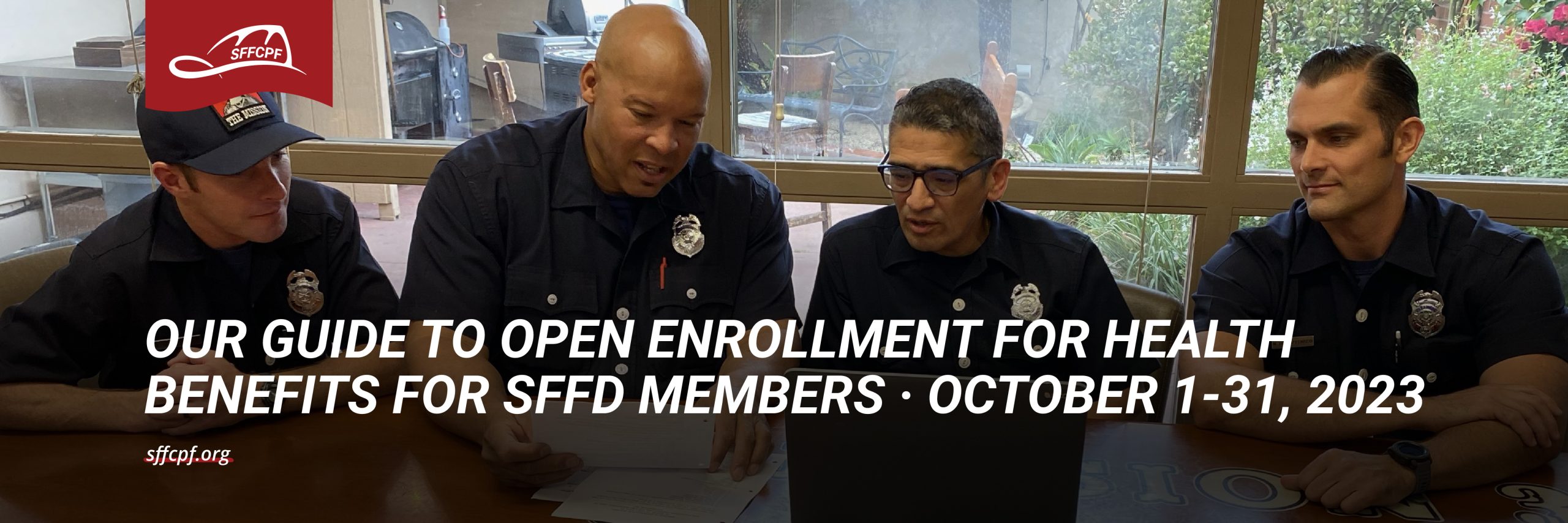Peggy Sugarman, PhD, Retired, Director Workers Comp | SFFCPF Board Director
October 1 marks the first day of Open Enrollment at the San Francisco Health Services System. Your choice of plan will affect you and your enrolled dependents for 2024.
For active (and many retired) firefighters who are diagnosed with cancer, your medical care is likely going to be handled by the SF Department of Human Resources’ Workers’ Compensation Division (WCD) as part of an accepted “cancer presumption” claim. Current policy within the WCD allows members a free choice of treating oncologists and most care is approved by the attending claims professional. Second opinions are generally approved and are sometimes encouraged, especially if the treatment is experimental. (Note: State law requires care to be based on scientific evidence-based studies, which can mean that cutting-edge treatment may be scrutinized more closely.)
But for your dependents who are diagnosed with cancer, your choice of health care plan is a critical decision. Our Health Navigators are often asked whether the member can change health care plans when the plan provider denies experimental or cutting-edge care. That answer is a resounding “No”. You may only change plans during Open Enrollment that goes from October 1 through October 31 each year unless you have a “qualifying life event”.
A qualifying life event is something that would change your health care needs, such as a birth, adoption, marriage, domestic partnership, or legal guardianship. Another would be if you move your primary residence outside of the plan’s service area. You must apply for enrollment within 30 days of the event. If you miss the deadline, you will have to wait until Open Enrollment.
Choosing Your Plan
It’s important to think about where you would want to obtain care if one of your eligible dependents is diagnosed with cancer. Each plan contains information about their participating physicians in a searchable database. By searching for oncologists, you can obtain details about the participating physicians, qualifications, and where they have hospital privileges.
Find out about each plan’s program using the following hyperlinks: Health Net CanopyCare HMO, Blue Shield of California Access+ HMO, Blue Shield of California Trio HMO, Kaiser Permanente HMO or Blue Shield of California PPO health plans.
Obtaining Second Opinions
Getting a second opinion in complex cases can be helpful for everyone concerned to ensure that all appropriate options have been discussed and that the treatment plan is clear. In every Health Navigation case, SFFCPF will identify a second opinion physician who is expert in the individual’s type of cancer, including out of the area. If insurance will not pay for the second opinion or other critical diagnostic tests, SFFCPF will provide financial assistance. Health Navigation and Financial Assistance is offered to active and retired members and their direct family members. Direct family members include Spouses/Domestic Partners (DP), Children, Siblings and Parents. Your Health Navigator will guide you through this process. Learn more about this benefit on our website’s Health Navigation page.
In workers’ compensation cases, you can request a second opinion from the attending claims professional, or work with our Health Navigators who can coordinate the request through the Firefighters’ Alternative Dispute Resolution Program – Ombusperson Maria Mariotto.
Handling Disputes
While you cannot change health care plans outside of Open Enrollment or a qualifying life event, you still have options that are governed by the State Department of Managed Health Care when treatment has been delayed or denied. All plans must have a grievance procedure in place that resolve disputed or denied care within 30 days. If after going through this process you continue to be denied the care that you wish, you may file for an Independent Medical Review (IMR) with the California Department of Managed Health Care (DMHC).
However, if there is an immediate threat to the patient’s health or the treatment was denied as experimental/investigational – which can often be the case in complicated cancer treatments — you may seek immediate assistance from the DMHC without going through the required grievance procedure.

